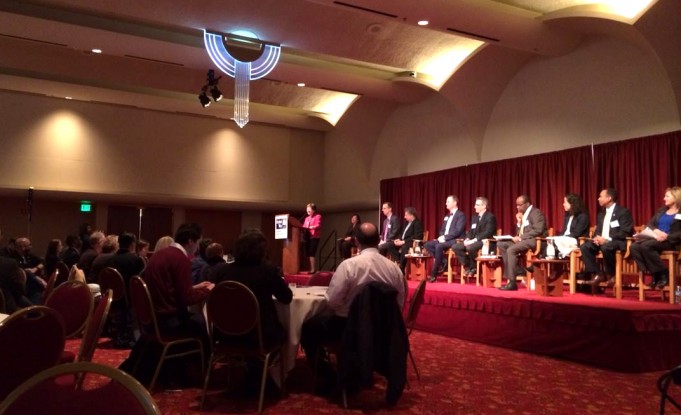Poverty is one of the largest challenges children and families face in Dane County. Today, local leaders convened at the Monona Terrace Community and Convention Center in downtown Madison to begin a conversation with the community on how, collectively, they can implement strategies to reduce poverty.
United Way of Dane County convened the Delegation to Create Economically Stable Families in 2014, led by UW-Madison Chancellor Rebecca Blank and former City of Madison Police Chief Noble Wray. The delegation shared its recommended strategies to increase the number of young families, particularly families of color, to become economically stable.
Blank led a community conversation with leaders and the public at today’s Strong Roots: Building Economically Stable Families event, which was sponsored by Alliant Energy Foundation. The Delegation’s recommended strategies that are part of a larger, year-long discussion on how the community wants to engage in reducing poverty and closing opportunity gaps. Civic, business and community leaders answered questions from community members on how they, along with the community, can take local approaches to reduce poverty in Dane County. 
Dane County Executive Joe Parisi, City of Madison Mayor Paul Soglin, American Family Insurance President, CEO and Chairman Jack Salzwedel, UW Hospitals President Ron Sliwinski, African American Council of Churches President Bishop Harold Rayford, Urban League of Greater Madison Board Vice Chair Derrick Smith, Centro Hispano Executive Director Dr. Karen Menéndez Coller, Oscar Rennebohm Foundation Early Childhood Program Director Jane Belmore and Wipfli’s Chief Human Capital Officer Claudio Diaz took part in panel discussions.
Since the fall of 2014, the delegation researched strategies that would decrease the number of families who are living in poverty and address the barriers for children and families of color in our community.
“The barriers families of color face in Dane County are critical and must be addressed,” said Chancellor Blank. “Access to quality, affordable childcare is a barrier to steady employment opportunities. Low-income families also face barriers regarding education, housing and health care. Our delegation is committed to finding solutions that lower these barriers, so these families can break the cycle of poverty.”
The Delegation devised four strategies:
1. In collaboration with partners, stakeholders and the community, develop holistic, two generation, coordinated supports that empower young families living poverty to increase their economic stability.
2. Increase the number of young families living in poverty who gain family sustaining employment.
3. Increase the amount of and remove the barriers to affordable housing available to young families living in poverty.
4. Increase the number of children in poverty who are developmentally ready to be successful in school.
“Each strategy comes with an armful of tactics to ensure more families in poverty can become economically stable,” said Noble Wray, co-chair of the delegation. “From expanding the reach of programs to creating a culturally diverse system of service providers that can connect families to the right services, these tactics will support families as they work toward a more stable life.”
“We are incredibly grateful for the work accomplished by the delegation, Chancellor Blank and Chief Wray,” said Renee Moe, president and CEO of United Way of Dane County. “Their collective research, understanding of local issues and development of strategies show the importance of supporting a family holistically. By focusing on education, income and health issues at the same time, a family in poverty will have a greater chance at successfully building a stable life.”
United Way will work with the community using the delegation’s strategies and will measure the number of families, especially families of color, enrolled and participating in the new, comprehensive, two-generational programming combining employment, housing and early childhood development that leads families out of poverty.
For the delegation’s full report, please click here.




























